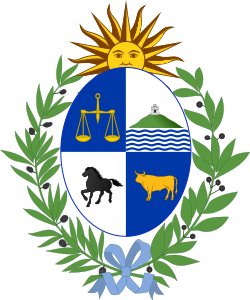| ||||||||||||||||||||||
| Results | ||||||||||||||||||||||
|---|---|---|---|---|---|---|---|---|---|---|---|---|---|---|---|---|---|---|---|---|---|---|
| ||||||||||||||||||||||
 |
|---|
A constitutional referendum was held in Uruguay on 8 December 1996. [1] The proposals, which included limiting each party to a single presidential candidate, were narrowly approved by voters.
| ||||||||||||||||||||||
| Results | ||||||||||||||||||||||
|---|---|---|---|---|---|---|---|---|---|---|---|---|---|---|---|---|---|---|---|---|---|---|
| ||||||||||||||||||||||
 |
|---|
A constitutional referendum was held in Uruguay on 8 December 1996. [1] The proposals, which included limiting each party to a single presidential candidate, were narrowly approved by voters.
The proposals were approved by both houses of the General Assembly on 15 October 1996. They included: [1]
| Choice | Votes | % | |
|---|---|---|---|
| For | 1,015,828 | 52.20 | |
| Against | 930,288 | 47.80 | |
| Total | 1,946,116 | 100.00 | |
| Valid votes | 1,946,116 | 96.66 | |
| Invalid/blank votes | 67,335 | 3.34 | |
| Total votes | 2,013,451 | 100.00 | |
| Registered voters/turnout | 2,343,920 | 85.90 | |
| Source: Direct Democracy | |||